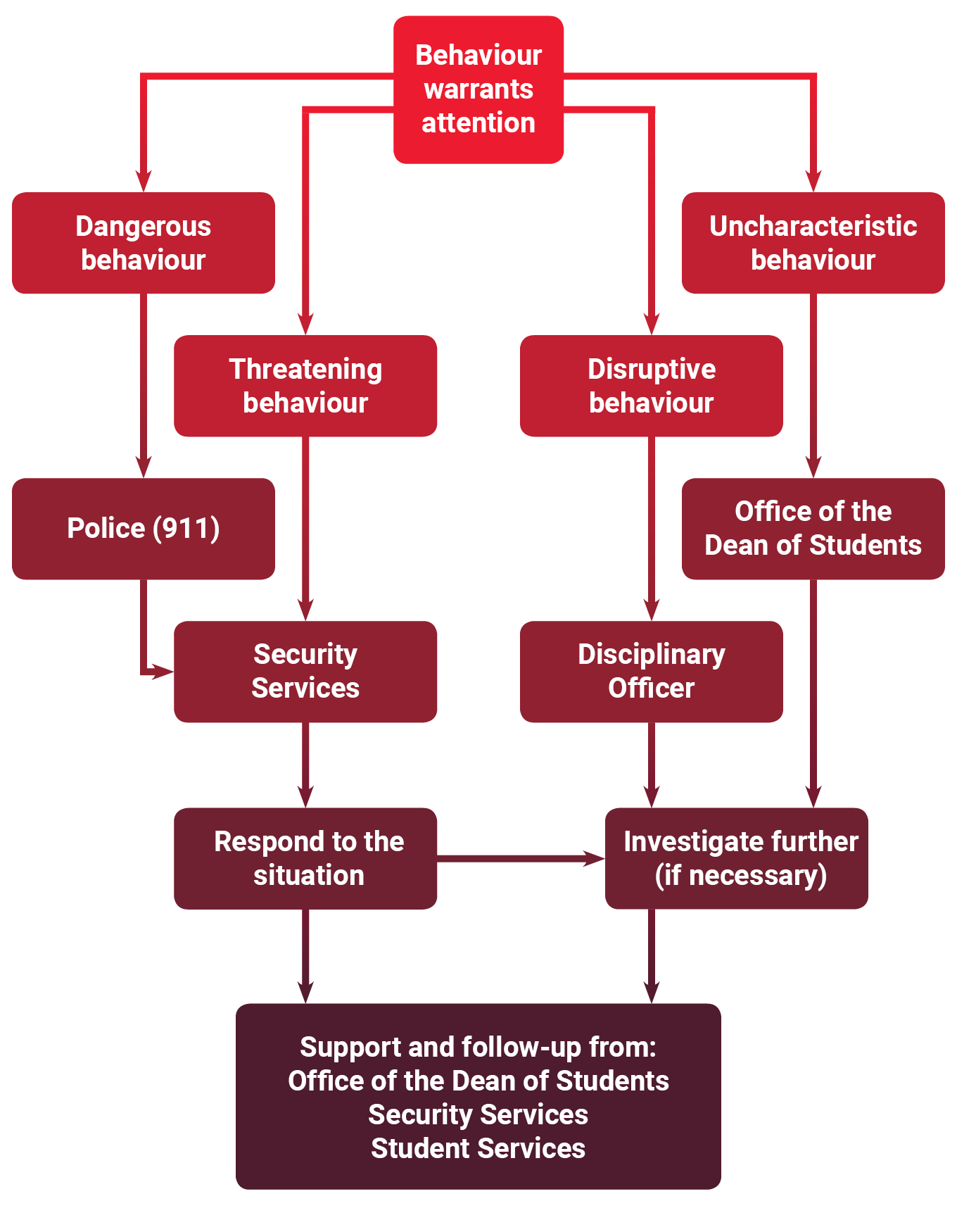McGill University has an obligation to provide a safe environment for learning and to protect the security of students while on University property. In turn, students have a responsibility to avoid disrupting or jeopardizing this safe learning environment.
For more details on university policies that outline these rights and responsibilities, click below.
University Policies that Pertain to Student Behaviour
The Charter of Students’ Rights states that the University has an obligation “to maintain safe and suitable conditions of learning and study” and “to ensure that adequate measures are taken to protect the security of students on University property” (Articles 7 and 8, Charter of Students’ Rights, Policies on Student Rights and Responsibilities, on the Secretariat website).
Article 5 (a and b) of the Policies of Student Conduct and Disciplinary Procedures states that:
“(a) No student shall, by action, threat, or otherwise, knowingly obstruct University activities. University activities include but are not limited to, teaching, research, studying, administration, public service. (b) Disruption which occurs during the teaching of a course or the conduct of research may be treated as an academic offence under the provisions of Article 19.”
Article 19 states: “No student shall, by action, threaten or otherwise knowingly cause a disturbance which obstructs teaching and/or research activities.”
In addition, Article 8 (a and b) of the Code of Student Conduct and Disciplinary Procedures states that:
“No student shall on property owned or occupied by the University, or in a University context: (a) assault another person, threaten another person or persons with bodily harm or damage to such person’s property, or; (b) knowingly create a condition which unnecessarily endangers or threatens or undermines the health, safety, well-being, or dignity of another person or persons, threatens to cause humiliation or threatens the damage or destruction of property.”
- Who to contact
- A student is exhibiting dangerous behaviour
- A student is exhibiting threatening behaviour
- A student is exhibiting disruptive behaviour
- A student is exhibiting uncharacteristic behaviour
- Confidentiality in a crisis situation
Who to Contact
In emergency situations (i.e., when a student’s health or well-being is at risk), the Dean of Students is the main contact with all third parties, including families.
Click on the tab that best describes your situation to find other support and contact information.

Dangerous Behaviour
If a student or others are in immediate danger, contact 911 from any campus telephone; Security Services will automatically monitor the call. If you use a cell phone, please follow-up by advising Security Services that you have called 911 (Downtown: 514-398-3000; Macdonald Campus: 514-398-7777).
Threatening Behaviour
To request intervention for behaviour that is disturbing and is creating a threatening or uncomfortable situation, contact Security Services (Downtown: 514-398-3000; Macdonald Campus: 514-398-7777). An agent will come to the location to assess the situation and possibly accompany the student to another location. Procedures are in place for investigation, support and follow-up.
Disruptive Behaviour
If a student is being disruptive but is not in crisis, contact the Disciplinary Officer in your Faculty, Athletics, Residences, or the Library. If you are unsure of what constitutes disruptive behaviour, review the limits to behaviour outlined in the ![]() Code of Student Conduct and Disciplinary Procedures.
Code of Student Conduct and Disciplinary Procedures.
Articles 21(a, b), 54.1(d), 68.1(f), 78.1(f) in the Code of Student Conduct empower a Disciplinary Officer to exclude a student from campus or a residence, with or without a disciplinary interview, while the matter is being investigated or the situation remedied. Instructors have the power to exclude a student from the remainder of a class and the following class (Article 21(c)).
Uncharacteristic Behaviour
To request investigation of behaviour that, while not immediately a safety concern, is disturbing, uncharacteristic or undermining the well-being of others, contact a Case Manager in the Office of the Dean of Students (casemanager [at] mcgill.ca; 514-398-4990). Procedures are in place for investigation, support and follow-up.
To learn more about Case Management, click here.
Examples of situations where you are encouraged to contact a Case Manager could include:
Worrisome communications
- Family have contacted you expressing concern about a student’s behaviour, distress, or lack of contact
- The student’s email communications or assignments include worrisome comments
- During a discussion with staff or other students, the student makes worrisome comments or exhibits worrisome behaviours
Isolation
- A previously involved student stops participating or has started to miss commitments or deadlines
Behaviour change
- Temperament changes (agitation, confusion, abruptness, outbursts, self-absorption)
- Inappropriate or uncharacteristic behaviour
Repetitive refusal to follow corrective measures
- Disregards advice regarding previous incidents
- Complains about “the system” being the problem
Confidentiality in a crisis situation
The Office of the Dean of Students upholds Quebec privacy legislation, which does not permit any information about a student to be released to any third party, including a member of a student’s family, without the student’s prior written consent. Emergencies give rise to exceptions under the provincial law and an emergency is defined as a situation in which a student’s health or well-being is seriously at risk.
